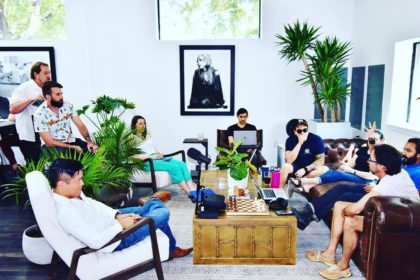
A characteristic of local economies that I never experienced much before leaving Palo Alto, California: “we can’t find co-founders!”
Many know that I’ve spent half of my professional life in Silicon Valley and the other half in the new economy’s most appealing innovation region: Central Texas. I’ve touched a few times on the stark differences in the way the cultures and environments behave, professionally; so when a wonderful thread started in a social media group, “we need more co-founders,” it sparked a different flavor of all too recurring discussion… I can’t find investors here; we have a tech talent gap here; there aren’t enough people here who want to be co-founders.
Roman Gonzalez, founder of Gardenio, “We have plenty of founders – everyone wants to be one – but a lot of teams dangle in limbo for far too long because they’re unable to connect to the right help.”
“There are plenty of properly skilled, talented employees out there with strong enough experience (in marketing, engineering, design, operations, business) who are disenchanted with their day jobs and thinking “man, what if I were my own boss” who would be good candidates to groom for exploring cofoundership. They may not want to bear the full burden of the company as a founder does. They, like founders, may just need the education, or the confidence, or the nudge to explore something more and take that risk.”
How do we build a better funnel for the just as important but meaningfully different co-founder role?
Change the culture and our expectations a bit. Frankly.
I read Roman’s brilliant observation and wondered first if it was true and second, if it is true (and I think it is), WHY are people not taking risks together??
It’s not that we don’t have co-founders, I posit, it’s that we don’t create enough value for people to share the risk rather than doing it themselves.; NOT because people are more successful themselves, because we let them think they could be.
How?
ONE: Stop perpetuating that Patents and Products do startups make. A team of one isn’t a team; and a one, of an idea or an MVP, isn’t likely to go anywhere.
TWO: Doing that though means putting more faith in the critical role of others (perish the thought LOL). Not just being willing to give 15% to a co-founder: splitting HALF. A product without an attainable AND monetizable AND defendable market isn’t worth anything… likewise, a business with a market but nothing scalable in which to invest, isn’t worth a ton either. Half of something is better than 100% of nothing… get a team of both and odds are you have something.
THREE: That means though that the equity has to be worth *something.* And a simple notion to keep in mind about the value of equity is – Exit or No?
Austin doesn’t do terribly well with that last decision, frankly, because we just want to be encouraging that we can build things.
What we might want to do more of, to foster people taking risks together, is encouraging founders think backward – Don’t think about how to start; think about how to get out – successfully. If the market won’t bear any exit… is it worth starting?? It could be worthwhile, granted – maybe a product needs to be built or people just want to start a business and get paid – but if the market won’t bear an exit, there is no outcome for investors. Think about that implication.
If the founders don’t want to exit, if they refuse to exit, if they want to retain control/ownership, etc., then that shared ownership is far less likely to be worth anything. There’s nothing to capitalize from if we can’t get an ROI of our investment of time/experience/talent in building something.
Of course, we can build a successful bootstrapped company and pay ourselves (and there is NOTHING at all wrong with doing that — UNLESS we founders aren’t on the same page about what we’re doing). A bootstrapping founder who expects to always be owner/CEO, until they’re done, likely can’t raise funding (financing, yes, but that’s a different topic). A person committed to getting acquired or going so big as to IPO = investor ROI.
So what happens when the founder is unclear about which they want?? It’s tough to do either and even tougher to get a co-founder on board who has their own ideas in mind.
Is your community one in which you REALLY don’t have potential co-founders and tech resources or does it just seem that way because such professionals are not interested in being available where you want them?
In Austin, I’ve found, it can seem that we don’t have people wanting to be co-founders because it’s inexpensive here (easy to start your own thing), our cap tables a little wonky (generally), and ventures are a little laissez-faire about Funding or Bootstrap. It’s muddy. And when it’s muddy, people tend to figure, “do it myself and find co-founders for what I want” rather than taking a risk with someone else who’s not sure what they want to build.
Generally speaking, everyone would rather be a co-founder than do it themselves. The answer to a lack of co-founders lies not in expanding the pipeline of candidates, it’s in exploring why everything thinks they’re better off doing it their way.
Is there really a tech talent gap?
Considering a great many new ventures, in our internet dependent economy, are in need of technical resources and we hear in many cities how we have a tech talent gap.
Do we, really?
In Austin, again as an example of my point of view, The University of Texas has become one of the most substantial producers of technical talent, in the world. Austin Community College is teaching people to code, Austin Coding Academy, Hack Reactor and Galvanize are here. And on the other side of the coin, my city and yours is flush with people under paid, under employed, or working but below the poverty line.
We know we have a challenge, don’t misunderstand me.
My partner in MediaTech Ventures, Randy Blankenship, “The time has come, evident in Austin, Texas, where we’re starting, and clearly critical in these reports thanks to Community Impact, to assist our local area workforce in short term subject-specific technical training that will fulfill the needs of companies who are having difficulties in finding employees to fill the void The time has come, evident in Austin, Texas, where we’re starting, and clearly critical in these reports thanks to Community Impact, to assist our local area workforce in short term subject-specific technical training that will fulfill the needs of companies who are having difficulties in finding employees to fill the void.”
The question we’re exploring here is if we’re addressing the gaps in a way that actually addresses them.
Something is off.
Do we really have a tech talent gap or are we failing to appropriately VALUE what we have?
Austin has TONs of technical talent; and I’d bet your city does too.
Most of the developers I know either want to do their own thing, or keep that option, they’d rather have 2 or 3 different projects, they’re all working for big companies, OR they work for development firms (agencies)
And it’s that last point that struck me as interesting… in a region where startups result in innovation with great value, engineers favor taking those risks. In a region of the world where tech jobs are paid well (better than the coasts?), people fill those jobs. So what does it mean when a region of the world has a great many development firms – teams of developers for hire.
They get paid well by dev firms so generally, rather than being available to entrepreneurs as developers, they have good jobs – working on many projects. Granted, this is an assessment relative to the coasts, and exacerbated by my points above: If we don’t give 50% of opportunities that are actually worth something, to technical partners, they can easily get paid working on many cool projects. The presence of dev firms means that they are doing that; and thus not obviously to fill “tech gaps” – which only exist because full-time company jobs are paying too little and startups are failing to create enough value.
A signal of that lacking value? Austin is generally considered to have too few “mid-career jobs” (and certainly does not pay engineers as well as the coasts). If you’re starting out your career as a developer, wouldn’t you go where the pay, potential, and career growth seems better?
Shaquille Gould, founder of TAGD, wrapped these thoughts well, in our social thread, ” there are a ton of engineers in Austin. Most work at dev shops or established companies. Four quick things:
1. Some engineers may never want to do a startup or become a cofounder
2. Most engineers don’t want to do your start up or become your cofounder (interest may not be there or founders are pitching wrong)
3. Find those that have similar business interests to you and don’t hold back equity. 10% of $1B is better than 100% of nothing. It takes time to find/build the right team.
4. Don’t give up”
In innovation, we “don’t have enough” isn’t the challenge to address. Explore instead that we don’t have enough (or seem to have enough), because…
I want to invite you to join me in such discussions live and together.
Join me online here



Texas has tough employment laws that prevent employees from moonlighting, especially technical talent. We also don’t have a large selection of number of people who both want to work in a startup and can afford to earn little to nothing, investing their own money oftentimes – once a startup has funding, they can find the talent but if Texas wants more startups – it needs to figure out how to fund more early stage founders. Texas needs to look at how it’s pro-business employment laws harm talent mobility and collaboration.
Very well said. Do we have a state that doesn’t support moonlighting? How so (I’m ignorant and unaware of how that’s the case)? Isn’t it a right to work state?
California…
It’s one of the things I immediately noticed this year splitting time between here and SV – here, if I want to do technical work for a company – they want non-competes and they own my work done, even after hours. Out there, everyone is sharing talent between the big tech companies and the startups. Many of my tech friends work at more than one place out there. But in Texas, if you want to work on diverse projects – you have to work at a dev shop.
I have seen a couple of accelerator programs with some awesome people, but the talent is simply “spread too thin”. The issue is everyone is “married” to their idea. When TW established the Gauntlet, I was hoping that they would “killed off” ideas that didn’t make it to the “next funding level”. But Founders of those could stay in the program, however, by reallocating their funding to another startup idea that’s still viable. In other words, simply join another team. Full transparency, I have been part of 2 accelerator programs so far. In both, I was recruiting …
Interesting model, flipping funding in failed ventures into those that are working… sounds a lot like a VC Firm to be frank LOL
#4 is my love language. Unpacking is great to getting to solutions.
Austin is a risky place to join a startup, at least for me. Between tax increases and property insurance increases, my mortgage is rising faster than my wages at a big company.
I considered leaving that gig for a startup, and would have taken less pay with some equity at a chance to do it all again. Unfortunately, the insurance benefits couldn’t touch what I have, and that benefit is everything given that the ONE option I had for the ACA didn’t cover my husbands oncologist.
That said, the upside could be worth the cut in benefits… I think about these things every day.
This was a great discussion, so much untapped talent out there.
Every start up community in every city says these things. I saw it in Phoenix, in Denver, and now in Dallas. I think some of it is a perception problem and the rest is a findability problem.
re: lack of understanding on how to commit – I’d argue, and this is based on my hanging with the young crowd, that most cofounders, certainly first time cofounders, aren’t sophisticated enough to care as much about the math of their ROI (15% or 50% – those numbers hardly mean anything to most talented people who aren’t also decently finance-savvy). I’m not sitting here being like “oh man, if it was 20% instead of 10%” until it’s negotiating time. It’s a leap. Everybody knows it’s a leap.
I think there’s a smaller pool of people who want to play second fiddle. I don’t think we’re teaching people how to play second fiddle. We’re teaching everyone how to play lead.
I have lived in TX for 20 years, “moonlighted” in some capacity for many of those myself, and now own a company whose employees are allowed, if not encouraged, to do the same. There are a bunch of companies who support this in TX but I do see quite a few owners who spend way too much energy with the “non-compete”. Most of the time, it’s just language in a contract (scare the little guy) and not really something anyone attempts to fight. I have also found that having conversations with management usually results in a good compromise for IT folks. Bottom line is, the technical talent has to start saying no to these employment contracts, as well as calling out companies for doing this, for things to really change from the ground up. In TX, the attitude I generally see from management is “Be lucky you have a job” which is sad, but as long as it doesn’t impact their ability to hire good talent, they will keep doing it.
Also, I will say that the companies we partner with who embrace this startup culture from their employees and vendors, are the ones who are utilizing technology the best and getting the best ROI for their investment. While they try to play hide-n-seek, their competition is capitalizing on opportunities quickly. Most of the ones I see who are laser focused on keeping their IT talent from working on other things, end up with a high turnover rate or worse, an entire IT team that know one wants and that is completely out of alignment with their goals. They are same ones that look back 5 years later and spend months trying to figure out why they have 30 projects “in-progress” with more excuses/failures than successes.
…Begin with the End in mind!
My explorations of this subject have led me to think we need to start thinking/labeling the scenario in terms of “gaps” – as opposed to a “gap”.
The workforce requirements for “building” a company are very different from those of “operating” a company, with the key distinction being that the former is more about creating business patterns and processes while the later is following them as efficiently as possible. Paul definitely hit on some great points relevant to “building”. The point about lacking mid-level management roles touches on the operational side.
I have alot of additional thoughts/stats/discoveries and not enough time to write them all here…. perhaps I’ll write a a followup article Paul O’Brien 🙂 Great stuff here.
Not only a follow up Corey Butler, I’d bet some people like Kerry A. O’Connor, Ashley Stroud Phillips, Erin Reilly, Chris Lofton,,, workforce oriented, tech/innovation, education, folks would love to get an Austin Summit or some such around thought leadership in this regard (not to speak for ya’ll ;))
Paul O’Brien – happy to be spoken for in this context! Workforce dev innovation, in my estimation, is largely overlooked and a huge need/opportunity
Very good article and it is very applicable. I am a technical lead for a startup and have been there for a few years now. We have almost doubled our ROI in just 1 year. You get what you are willing to pay for in regards to your tech talent. Lots of talent out there for the right price.
Nice article. Begin with the end in mind. Makes sense. Personally, I’m a Biz/Product Founder and had a heck of a time finding good Eng. Eng is getting sucked up by crypto startups, and top10 chains that pay $ through grants. Me now too as probably EIR with (tba) protocol